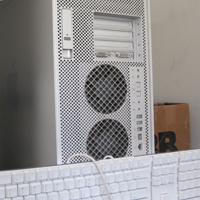Eco-Ambassadors work to improve recycling and sustainability on campus
Will Ozbun is a sophomore, a government and environmental policy double major, and an avid tennis player. He is working under Associate Athletic Director Steve Cole to set up a recycling program for old tennis balls. According to Ozbun, the tennis teams go through about 2,880 tennis balls per year.
Ozbun has contacted an Arkansas firm called “Rebounces,” which recharges old tennis balls that have lost pressure and can no longer be used. Rebounces uses a special Green Machine to re-pressurize the balls then ships them back or sells them at reduced prices. If the balls are too worn to be re-pressurized, Rebounces will send them to adult-care facilities, hospitals, and schools to be used on the bottoms of furniture and walkers to provide stability and reduce noise.
Ozbun will work with the W&M tennis teams to collect old balls and ship them to Rebounces at no cost to the College. Additionally, Ozbun is working to recycle plastic tennis-ball containers.
Thuy Tran, a junior neuroscience major, is also working with athletics. She is setting up a recycling program for athletic shoes. The Nike store in the Prime Outlets will accept used athletic shoes, box them, and ship them to their headquarters at no charge to the College. Tran is working to create drop-off locations on campus.
“Through our recycling projects, we hope to establish a functioning framework that will allow the athletes and future Eco-Ambassadors to process used athletic shoes and tennis balls in an environmentally conscious way. Just because the items are no longer useful here, that doesn’t mean they are useless outside of William & Mary,” said Tran.
Cole wants to do more. He has asked Tran and Ozbun to investigate options for alternative energy and to help reduce fertilizer application on athletic fields.
“The Athletic Department is excited to host Eco-Ambassadors to assist in our sustainability efforts,” Cole said. “We look forward to the opportunity to provide continuing education for our staff and students on sustainability projects as well as campus efforts.”
Junior Julia Casciotti and sophomore Dominique Paxton are working with Scott Polk, fixed assets manager in the Office of Procurement, on an electronics recycling program. Many of the College’s computers are covered by a contract with the manufacturer, which takes them back at the end of their useful life. However, computers not under contract may sit in storage for years because the staff doesn’t know what to do with them.
Casciotti and Paxton are setting up a program to collect old computers, wipe the hard drives, and sell them on a College-approved auction site.
“Electronics recycling interests me because if you really think about it, every student has a computer, cell phone, or some sort of music device,” Paxton said, “but what happens to it when they're finished with it? I hope that my project will be able to answer that question and provide a sustainable and economical solution to efficiently recycle or reuse old electronic devices.”

Freshman Sarah Appleton and junior Maegan Crews are working on separate recycling issues involving Swem Library and the Art and Art History Department.
With guidance from Karen Berquist, the coordinator for Science Libraries, Appleton is setting up a book and media exchange at Swem Library. The goal is to provide students with a way to share expensive textbooks, or to pick up some new reading material, CDs or DVDs. Additionally, Appleton will be working on a recycling education campaign in Swem to reduce contamination of the recycling bins with trash.
Crews is helping Art Professor Elizabeth Mead collect and store construction waste for use on art projects. Materials like scrap wood, Tyvec, plaster, clay, Styrofoam, bricks, concrete, and cardboard are all in demand. She is currently working to find a storage location on campus for the material she collects.
She hopes that, “people won't see the recycled materials as inferior; rather, that using them will just become an everyday thing.”
Sophomore Patrick Foley is working with Professor John McGlennon in the Government Department on campus transportation. Foley will start with a student survey to determine the best way to increase awareness and ridership of the Williamsburg Area Transportation Authority (WATA) bus system. While the campus has recently welcomed Zipcar and seen the expansion of the carpooling program, city buses remain one of the most convenient ways for students to get around Williamsburg. They are even free to use with a W&M student ID.
Foley hopes to discover the reasons that students are not using the buses more frequently and find ways to make that mode of transportation more appealing to them.
Finally, junior Morrison Mast is working with Geographic Information Systems (GIS) Director Stu Hamilton to map fisheries, and will be using data sets from NASA satellites to study the effect that shrimp farming has on the coasts of Ecuador.
Because of an increase in foreign investment in the farms, shrimp farming has been replacing Ecuador’s natural mangrove habitat for the past 30 years. Mast will use the data to determine a relationship between the emergence of shrimp farms and the level of nutrients present in downstream estuaries. Mast recently met with Hamilton to see some images of the affected areas in Ecuador.
“The contrast between the beauty of the natural landscape and the blandness of a shrimp farm lent a lot of weight to the importance of this research,” Mast said.
W&M’s Eco-Ambassador internship program was created in 2009. Sponsored by the Committee on Sustainability, Eco-Ambassadors may be eligible to receive independent study credit for two semesters through the Environmental Science and Policy program. The internship consists of 5-10 hours per week creating and implementing a sustainability project in a particular department or office, in collaboration with a supervising staff member.


















